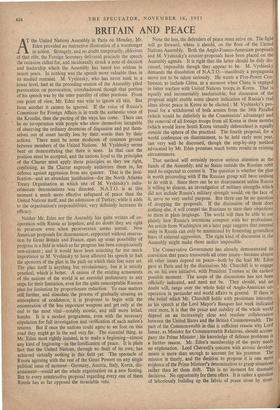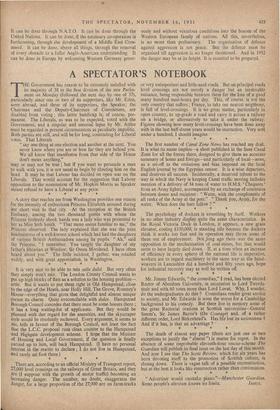BRITAIN AND PEACE
T the United Nations Assembly in Paris on Monday, Mr. Eden provided an instructive illustration of a warmonger in action. Strangely, and no doubt temporarily, oblivious of that role, the Foreign Secretary delivered precisely the speech the occasion called for, and incidentally struck a note of decision and leadership which the Assembly has heard too seldom in recent years. In nothing was the speech more valuable than in its studied restraint. M. Vyshinsky, who has never sunk to a lower level, had at the preceding session of the Assembly piled provocation on provocation, overshadowed though that portion of his speech was by the utter puerility of other portions. From one point of view, Mr. Eden was wise to ignore all this. But from another it cannot be ignored. If the voice of Russia's Commissar for Foreign Affairs is in truth the authentic voice of the Kremlin, then the parting of the ways has come. There can be no co-operation with people who show themselves incapable of observing the ordinary decencies of discussion and put them- selves out of court hardly less by their words than by their actions. There must be some modicum of common ground between members of the United Nations. M. Vyshinsky seems bent on demonstrating that there is none. In that case the position must be accepted, and the nations loyal to the principles of the Charter must apply those principles as they see right, combining, as the Charter expressly authorises them to, for defence against aggression from any quarter. That is the justi- fication—and an abundant justification—for the North Atlantic Treaty Organisation at which one of M. Vyshinsky's indis- criminate denunciations was directed. N.A.T.O. is at this moment a much more effective safeguard of peace than the United Nations itself, and the admission of Turkey, while it adds to the organisation's responsibilities, very definitely increases its efficacy.
Neither Mr. Eden nor the Assembly has quite written off co- operation with Russia as hopeless, and no doubt they are right to persevere even when perseverance seems unreal. New American proposals for disarmament, supported without reserva- tion by Great Britain and France, open up some possibility of progress in a field in which so far progress has been conspicuously non-existent ; and it would have been attaching far too much importance to M. Vyshinsky to have allowed his speech to halt the sponsors of the plan in the path on which their feet were set. The plan itself is anything but revolutionary, but it is strictly practical, which is better. A census of the existing armaments of the nations of the world is an essential preliminary to any steps for their limitation, even for the quite unacceptable Russian plan for limitation by proportionate reduction. To ease matters still further, and stimulate the process of gradually creating an atmosphere of confidence, it is proposed to begin with the enumeration of the less important weapons and get only at the end to the most vital—notably atomic, and still more lethal, bombs. It is a modest programme, even with the necessary stipulation for full investigation and verification of each nation's returns. But if once the nations could agree to set foot on this road they might go in the end very far. The essential thing, as Mr. Eden most rightly insisted, is to make a beginning—almost any kind of beginning—in the fortification of peace. It is plain fact that the United Nations, through no fault of its own, has achieved virtually nothing in this field yet. The spectacle of Russia agreeing with the rest of the Great Powers on any single political issue of moment—Germany, Austria, Italy, Korea, dis- armament—would set the whole organisation on a new footing. But to every constructive proposal regarding every one of them Russia has so far opposed the invariable veto. None the less, the defenders of peace must strive on. The figh will go forward, where it should, on the floor of the United Nations Assembly. Both the Anglo-Franco-American proposal: and M. Vyshinsky's counter-proposals have been placed on thc Assembly agenda. It is right that the latter should be duly dis- cussed, impossible though they appear to be. M. Vyshinsky demands the dissolution of N.A.T.0.—manifestly a propaganda move not to be taken seriously. He wants a Five-Power Con- ference, to include China, at a moment when China is engaged in bitter warfare with United Nations troops in Korea. That is equally and incontestably inadmissible, but discussion of the proposal might enable some clearer indication of Russia's real ideas about peace in Korea to be elicited ; M. Vyshinsky's pro- posal for a withdrawal of both armies from the 38th Parallel (which would be definitely to the Communists' advantage) and the removal of all foreign troops from all Korea in three months (which would leave South Korea virtually defenceless) is equally outside the sphere of the practical. The fourth proposal, for a world conference on disarmament, to be held early next year, can very well be discussed, though the step-by-step method advocated by Mr. Eden promises much better results in existing circumstances.
That method will certainly receive serious attention at the hands of the Assembly, and no States outside the Russian orbit need be expected to contest it. The question is whether the plan is worth proceeding with if the Russian group will have nothing to do with it. Since there can be no disarmament unless Russia is willing to disarm, an investigation of military strengths which did not include Russia's military strength would, on the face of it, serve no very useful purpose. But there can be no question of dropping the proposals. If the discussion of them does nothing else, it will compel the Russians to state their objections to them in plain language. The world will then be able to see plainly how Russia's intentions compare with her professions. An article from Washington on a later page suggests that internal unity in Russia can only be maintained by fomenting groundless fears of external aggression. The right kind of discussion in the Assembly might make those tactics impossible.
The Conservative Government has already demonstrated its conviction that peace transcends all other issues—because almost all other issues depend on peace—both by the lead Mr. Eden gave at Paris and by the discussions Mr. Churchill is to engage in, on his own initiative, with President Truman at the earliest possible moment. The scope of the discussions has not been officially indicated, and need not be. They should, and no doubt will, range over the whole field of Anglo-American co- operation in particular and world affairs in general. If there is one belief which Mr. Churchill holds with passionate intensity, as his speech at the Lord Mayor's Banquet last week indicated once more, it is that the peace and stability of the whole world depend on an increasingly close and resolute collaboration between the United States and the British Commonwealth. The part of the Commonwealth in that is sufficient reason why Lord Ismay, as Minister for Commonwealth Relations, should accom- pany the Prime Minister ; his knowledge of defence problems is a further reason. Mr. Eden's membership of the party needs no explanation. Lord Cherwell's concern with atomic develop- ments is more than enough to account for his presence. The mission is timely, and the decision to propose it is one more evidence of the Prime Minister's determination to grasp situations rather than let them drift. This is no moment for dramatic decisions. No opportunity for them offers. It is rather a question of laboriously building up the fabric of peace stone by stone. It can be done through N.A.T.O. It can be done through the United Nations. It can be done, if the necessary co-operation is forthcoming, through the development of a Middle East Com- mand. It can be done, above all things, through the removal of every obstacle to a fuller Anglo-American understanding. It can be done in Europe by welcoming Western Germany gener- ously and without vexatious conditions into the bosom of the Western European family of nations. All this, nevertheless,,, is no more than preliminary. The organisation of defence against aggression is not peace. But the defence must be organised till aggression is no longer threatened. And in 1952 the danger may be at its height. It is essential to be prepared.















































































 Previous page
Previous page